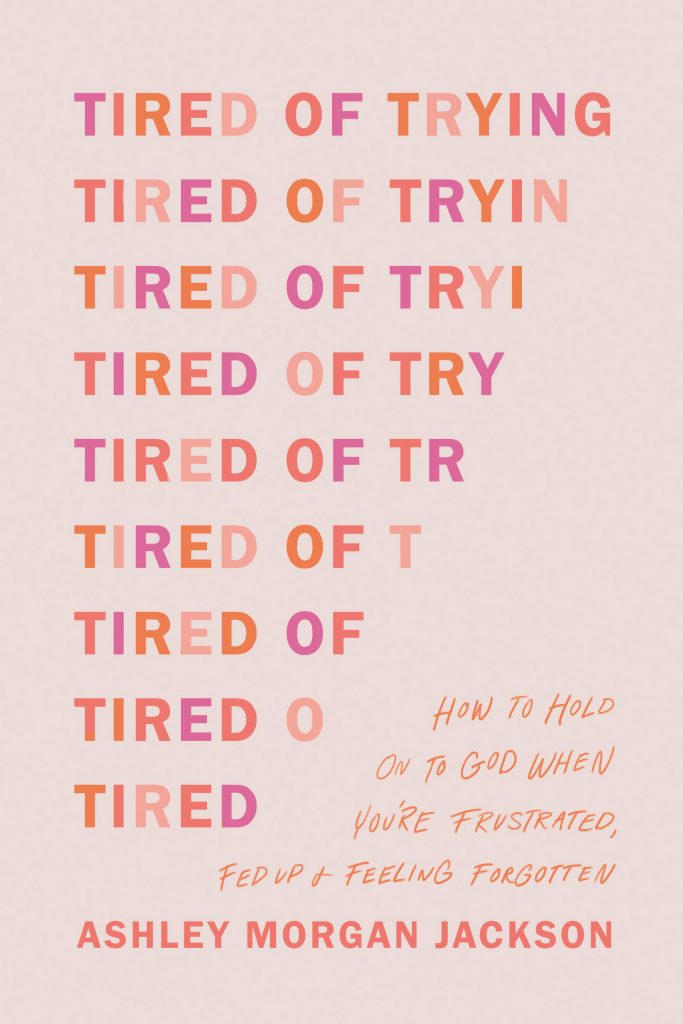Friend, maybe you are tired of trying because God wants you to recognize you don’t need to keep trying. Instead of trying to fix things by being strong enough, good enough, and smart enough, God wants you to stop relying on yourself and your own efforts.
By Ashley Morgan Jackson, excerpted from her book Tired of Trying: How to Hold On to God When You’re Frustrated, Fed Up, and Feeling Forgotten
Each of us deals differently with our frustration with God. Perhaps “checking out” is your go-to strategy. Or maybe your heart is shattered, and your frustration shows up as anger. Perhaps you’ve learned to cope by getting busy and trying even harder. Or maybe when you start to feel sad, depressed, or forgotten by God, your default is to find some way to “numb out.” It might be overindulging in junk food, shopping for things you don’t need, binge-watching reality television, playing with electronic gadgets, or misusing your substance of choice.
In my five years of feeling let down by God, I cycled through each of these frustration management strategies. My inability to find relief turned to deep depression, my thoughts constantly churning over what an awful person I was for not being the capable individual I had always considered myself to be. But no matter how hard I looked for solutions, I couldn’t fix myself and I had no idea why.
My frustration led me to question God.
Why are you being so mean?
Are you doing this on purpose?
Where are you? I need you!
I’m guessing you have your own frustrating thoughts and questions as hot tears roll down your cheeks on yet another night you cannot sleep.
This is not how my life is supposed to be.
How can this be God’s plan?
When will this end?
And maybe the weightiest question of all: Why?

Photo credit: Umit Bulut
But what if the frustration itself is the answer we seek? What if we could reframe this difficult season so that we see it not as something God is allowing to happen to us, but for us? What if we chose an entirely different way of dealing with our frustration?
When we are tired of trying, there is nothing left to do but to get real with God about where we are and how we are feeling. Allow me to let you in on a little secret; God already knows anyway. God isn’t surprised by our indignation. He isn’t put off by our pity parties or our shouts to heaven that we’re giving up. God cannot be anything but faithful to us. It’s okay to admit our weakness and our frustrations. In fact, it’s absolutely necessary.
Since the beginning of time, God has been dealing with people just like us who are flawed, insecure, and sinful. That is exactly why He sent Jesus to be for us what we never could be for ourselves.
Friend, maybe you are tired of trying because God wants you to recognize you don’t need to keep trying. Instead of trying to fix things by being strong enough, good enough, and smart enough, God wants you to stop relying on yourself and your own efforts. Maybe tired of trying is exactly where God needs you to be because it’s the only way to get you to face whatever it is you’re trying very hard not to face.
God wants us to trust Him enough to let Him deal with whatever it is we’re avoiding.
God wants us to trust Him enough to let Him deal with whatever it is we’re avoiding. He already knows what it is anyway. But just as Jacob was terrified of having to face Esau, we are scared to death of what the outcome of facing these things with God might be. We are looking for any way out or around, but when God comes to bring true change in our lives, the only way out is through. God has a plan, and it is always for our good; but He must first reveal to us what is buried beneath our fears, and that revelation often comes through times of testing.
According to James, the testing of our faith, those moments when frustration is all-consuming, actually produces something good in us: steadfastness. “Count it all joy,” he writes, “when you meet trials of various kinds, for you know that the testing of your faith produces steadfastness” (James 1:2-3).
James goes on to write, “Let steadfastness have its full effect, that you may be perfect and complete, lacking in nothing” (James 1:4, emphasis added). To understand the full effect, we need to understand what James means by lacking in nothing.
Many of us believe God allows only the good, the blessed, and the best in our lives. And by that, we mean the easy, the happy, and the preferred. But even if that were true, let’s be clear about what constitutes the good, the blessed, and the best from God’s perspective. I would argue that the best things for us aren’t necessarily the easiest things, but instead the deep internal work that often goes beyond our immediate understanding. God uses seasons of frustration to produce something good in us: making us more like Christ. That is what it means to be “perfect and complete, lacking in nothing.”

Photo credit: Jan Tinneberg
I would argue that the best things for us aren’t necessarily the easiest things, but instead the deep internal work that often goes beyond our immediate understanding.
Many of us believe God allows only the good, the blessed, and the best in our lives. And by that, we mean the easy, the happy, and the preferred. But even if that were true, let’s be clear about what constitutes the good, the blessed, and the best from God’s perspective. I would argue that the best things for us aren’t necessarily the easiest things, but instead the deep internal work that often goes beyond our immediate understanding. God uses seasons of frustration to produce something good in us: making us more like Christ. That is what it means to be “perfect and complete, lacking in nothing.”
When you slow down and really dig into the emotions you’re walking through now, it may hit you right between the eyes—it’s not a shallow irritation but a deep sense of insecurity or dissatisfaction in the pit of your soul. It’s an unfulfilled need that makes you question your core beliefs and rocks your trust in a good God. And it’s not just any passing feeling but a chronic one.
If you had to put words to it, what is it you feel most insecure about or dissatisfied with right now? Sit with that insecurity or dissatisfaction for a moment. This is likely the core issue that is making you tired of trying. It’s probably the reason you feel exposed, your deepest fears naked for all to gawk at, and why you’re quickly losing the control you’ve tried so hard to maintain, perhaps for years. What are the unresolved problems in your life at the moment? What about unfulfilled needs?
There is such a temptation to rush past questions like these to get to the “answers,” but I think any good counselor or therapist would agree with me that the answers may not end up being as important as the questions we need to ask ourselves about why we feel frustrated to begin with. The world is so fast paced, and we are desperate for quick solutions to make our problems disappear; but that is not how wrestling works. We have to be brave enough to hold on to God and look at the things we have been running from.
Feeling tired of trying doesn’t come from a lack of potential solutions, but a lack of allowing ourselves to face the roots of our frustration and the roots of the pain that cause it. To recognize the wrestling seasons in our lives, we have to be willing to look beyond the symptoms—our frustrations—to the cause. Our willingness to be honest about our struggles is the testimony we can share with the world about what walking with Christ really looks like. With our lives, we demonstrate that it’s possible to be both flawed and unconditionally loved.
Featured image photo credit: Abby Bernet
You’ve been reading from Tired of Trying
Tired of Trying: How to Hold On to God When You’re Frustrated, Fed Up, and Feeling Forgotten
by Ashley Morgan Jackson
What if that hard thing you’re going through is not happening to you but for you?
You’ve tried it all—saying the right words and prayers, reading the right Bible verses—but nothing seems to work. What do you do when your faith doesn’t seem to be “working” anymore?
Ashley Morgan Jackson is no stranger to this kind of spiritual exhaustion and discouragement. Much like the biblical character Jacob, Ashley wrestled with God, trying desperately to keep trusting Him despite her pain. It was here she found that sometimes God requires us to hold on to Him so we can let go of everything holding us back.
Rich with biblical encouragement, personal story, and practical application, Tired of Trying is an invitation to wrestle—and face God in your greatest fears, pains, and unanswered questions.
You’ll learn to: break out of the cycle of frustration by saying yes to wrestling; identify the lies you are believing about God, yourself, and your circumstances and replace them with truth; shift your perspective so you can choose faith, persevere, and discover God’s purpose for you.
Choosing to wrestle isn’t easy or quick—but it does have purpose. What seemingly tears us down may be an opportunity to grow. God is good at redeeming heartache. When we reach the place where the only choice is to run to God or run from Him, we can hold tight . . . because transformation and blessing will come.
About the Author
Ashley Morgan Jackson
- Visit Ashley Morgan Jackson’s website
- Find Ashley Morgan Jackson on Facebook
- Follow Ashley Morgan Jackson on Twitter
- Find Ashley Morgan Jackson on Pinterest
- Ashley speaking at Sifted
- Follow Ashley Morgan Jackson on Instagram





